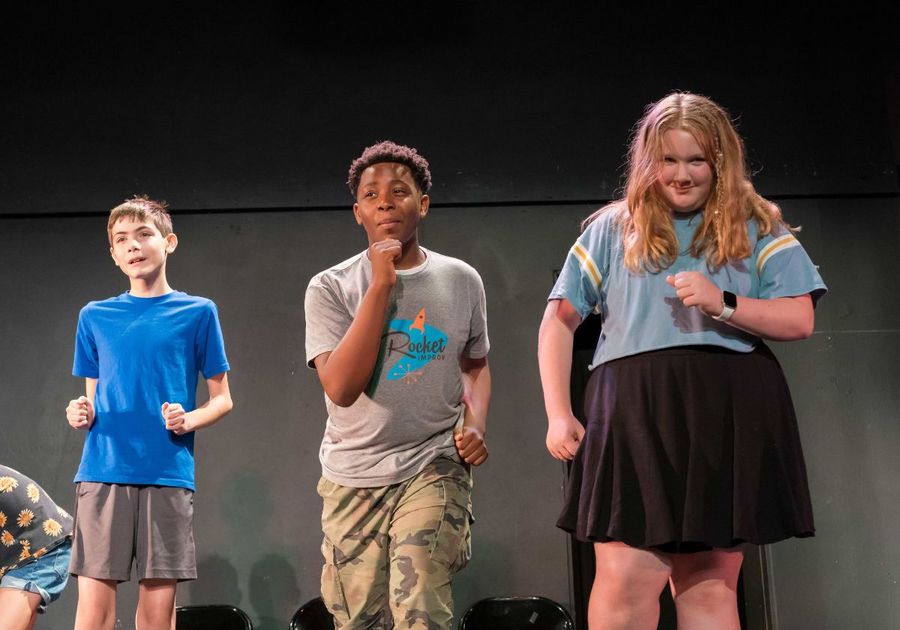Anyone who has been fortunate enough to watch some live, quality improv has most likely assumed that comedic improvisers are a confident bunch. The players run up onstage with no idea of what they are about to do and then come up with crazy scenarios and wild characters right on the spot! (And if you’re thinking, “What’s improv?” then get thee over to YouTube, watch some Whose Line Is It Anyway, and jump back over to this article!)
The reason why improvisers appear to be so bold onstage is because they train to be bold -- or rather they train to act bold. And they practice building confidence in a number of ways. Here is one of the ways your child (or really, anyone) can boost their confidence through improv training.
What does it mean to “yes, and?”
“Yes, and” is the golden rule of improvisation and is crucial to moving things forward. When using “Yes, and” an improviser agrees to the facts and circumstances of the scene and then adds information.
Player A acts concerned: “Doctor, the lump on my knee is getting bigger!”
Player B needs to respond in such a way that does not deny any information that has been stated or implied thus far.
Player B assumes the posture and mannerisms of a doctor: “Mrs. Franklin, it appears your knee is sprouting a head.”
If Player B had said, “Sorry, I’m just the janitor,” then the scene would’ve ground to a halt! In improv-speak that is called a “denial.” Denials are a big no-no.
But not only do improvisers learn to “Yes, and” their scene partner, they also learn to “Yes, and” themselves.
Your first idea is enough
Have you ever been asked to come up with a word, any word, and you just froze? There are just so many choices! Insecurities can start to pop up, “What kind of word? Does it need to be clever? Do I need to sound smart?” And then your mind thinks of a word but then rejects word after word after word searching for the one right most perfect word.
Rejecting your own ideas is saying “no” to yourself. It’s a denial.
Improvisers are taught to accept, not judge their first idea -- whatever it is! So instead of flipping through a bunch of different ideas in your head like you’re shuffling mental flashcards, just say the first one that comes to you. It’s so freeing! Over time the novice improviser learns that their first idea is enough. They don’t need to come up with anything clever or funny or interesting -- just something. And then that something is “Yes, anded” into something cool, like a simple lump on a knee becoming a knee growing a head!
When you learn to trust that your first instinct is enough, it is easier to get out of your own way and just go with the flow. And typically the first thought that you unleash from your brain is gold simply because it wasn’t planned.
Let’s go back in time and look again at our previous scene between Mrs. Franklin and the doctor. (Going-back-in-time sound effects…. Doodlee-doo! Doodlee-doo!)
Just before the scene started, two improvisers had stepped forward and asked the audience for the suggestion of a word to inspire their scene.
“Injured!” shouts an enthusiastic audience member.
The improvisers thank the audience member for the suggestion and -- in a brief moment -- a small idea is hatched.
In a split second Player A remembers how she had painfully banged her knee against the coffee table earlier that day. And that is all the inspiration she needs to “Yes, and” herself and come up with a first line. And being the expert improviser that she is, she also labels the other character (doctor), states what is going on (the knee problem), and infers a location (doctor’s office) in a natural-sounding way. Boom! A perfect 4-line “scene initiation” is born!
“Yes, and” yourself
It looks easy because improvisers are trained to be inspired by anything and everything, not question their ideas, and just GO. If they worry about coming up with something funny then hesitation, anxiety, and self-judgment creeps in. Not good.
Matt Walsh, professional actor (Veep) and original member of the Upright Citizens Brigade would tell his students, “At the beginning of a scene, have half an idea.” Because really, that’s all you need to get a scene rolling.
When improvisers train -- be they kids or adults -- they get into the habit of being comfortable spontaneously expressing themselves. And since improv is a form of brain-training, anything one learns in improv can easily seep over into one’s day-to-day life.
“Yes, and’ing” yourself is one of the many ways improv can teach people of all ages to be more confident both onstage and in life! The next time someone asks you to come up with something, just say or do the first thing that comes to you without self-judgment or hesitation. You may end up surprising yourself!
Lulu French has been teaching improv for two and a half decades and is the Director and Head Instructor at Rocket Improv, an improv school for kids, tweens and teens located in South Orange, NJ. If you are interested in improv training for your child, further information can be found on their website: www.rocketimprovcomedy.com.


